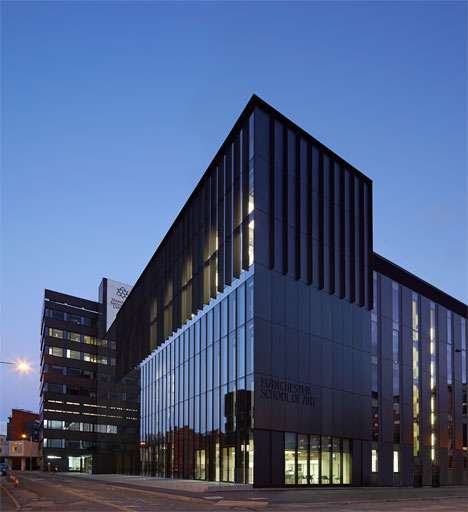Art school extension with wooden stairs and bridges by Feilden Clegg Bradley Studios
A series of steel-braced oak staircases and bridges connect the different levels of this extension to the Manchester School of Art by Feilden Clegg Bradley Studios (+ slideshow).
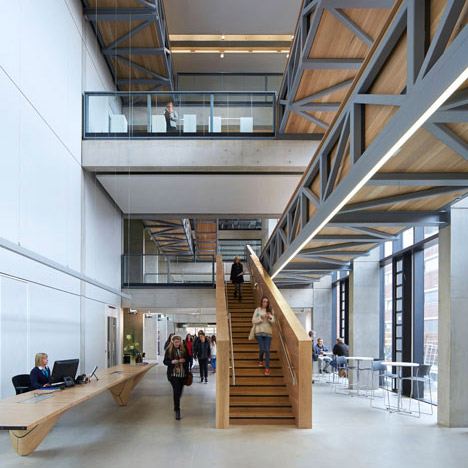
London architects Feilden Clegg Bradley Studios designed the extension to link the original nineteenth century art school building to a 1960s tower, which was also refurbished as part of the project.
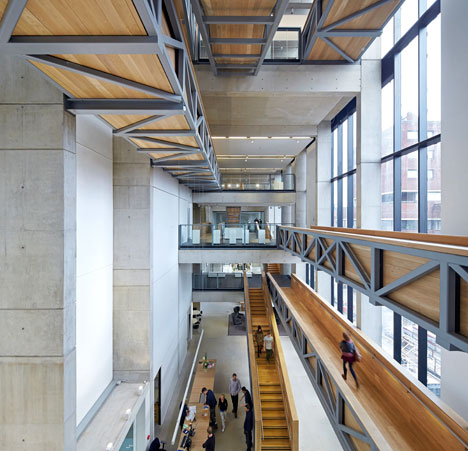
A bank of lifts ascends from next to the entrance to every storey of the tower, with bridges and staircases helping to unite the old and new buildings.
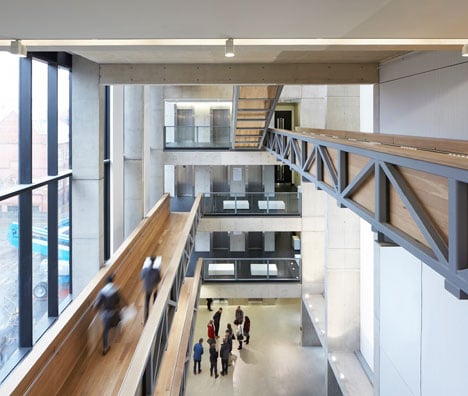
The new building provides additional studio, workshop and exhibition spaces for the school's 3500 students and features a seven-storey glazed facade, which creates an exhibition and events space that can be seen from the street outside.
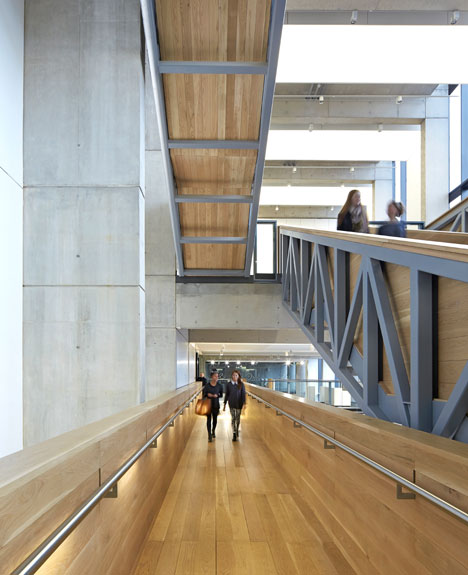
Behind the gallery-like facade is a longer, lower building containing studios, workshops and teaching areas, which were designed in an open plan format to encourage interaction between students from the 30 disciplines that share the space.
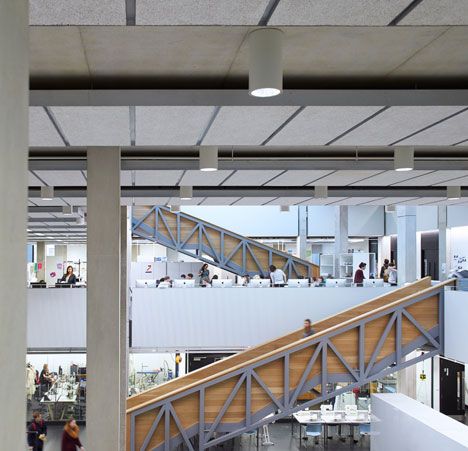
"Private spaces no longer exist," described John Brooks, vice chancellor at Manchester Metropolitan University, of which the art school is now a faculty. "What you'll find are lots of spaces that are intersected by passageways, walkways, stairwells and glass partitions, so whatever you're doing is almost like a performance."
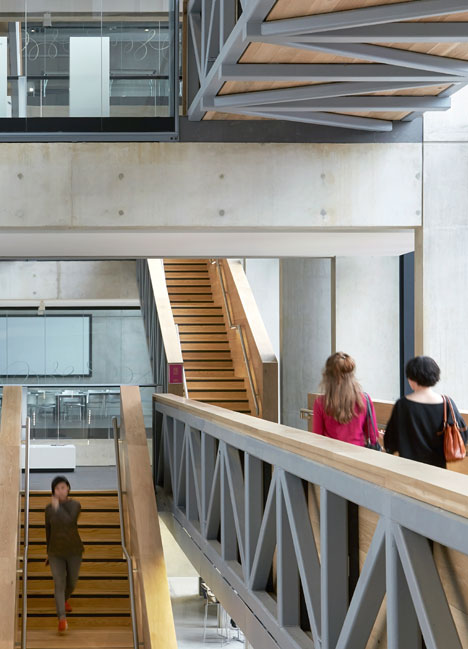
Referencing the aesthetic of traditional local warehouses, the architects applied industrial materials including concrete, steel and glass throughout the interior, while the open spaces and comprehensive use of glazing fill the building with natural light.
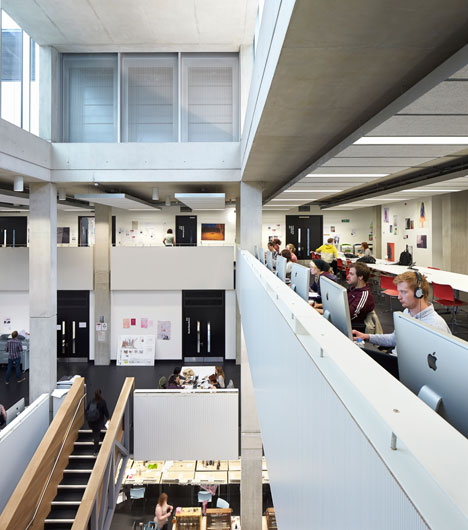
"This building is all about light," said architect Keith Bradley. "The way that we've created a series of cascading floorplates, almost like a landscape of floors, allows light deep into the space so that we can still get the combination of people working together but also get good natural daylight."
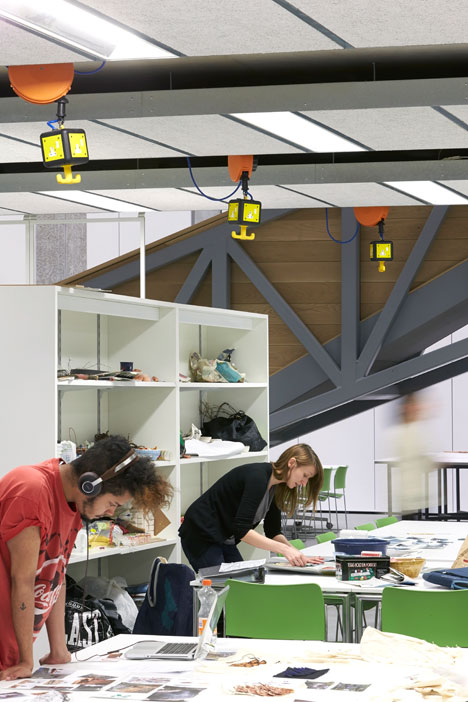
Concrete is treated with different surface finishes to demarcate the spaces; smooth in most areas, but with a rough texture created by casting it against chunky chipboard on the walls of the staircases.
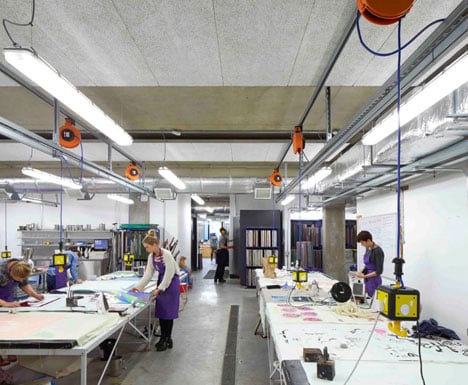
Four of the double-height columns inside the studio and workshop building feature a decorative pattern that was produced during the concrete casting process. The pattern was designed in the early twentieth century by Lewis F. Day, a former tutor at the school.
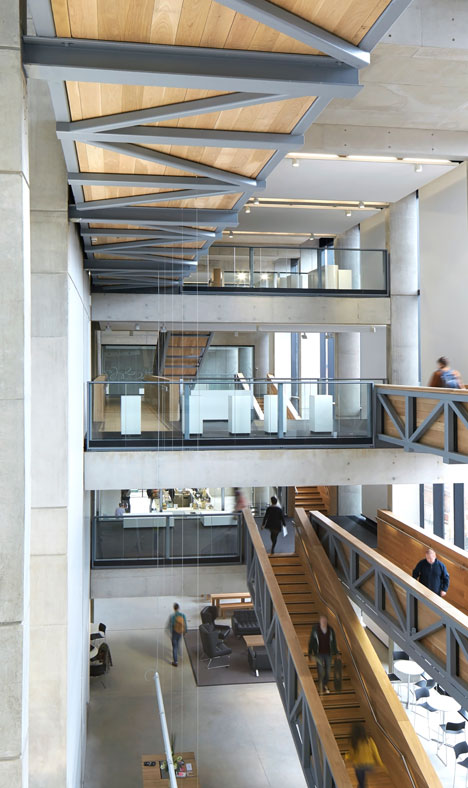
Oak was used to line the staircases and linking corridors, and provide a warm and tactile contrast to the raw materials that dominate the interior.
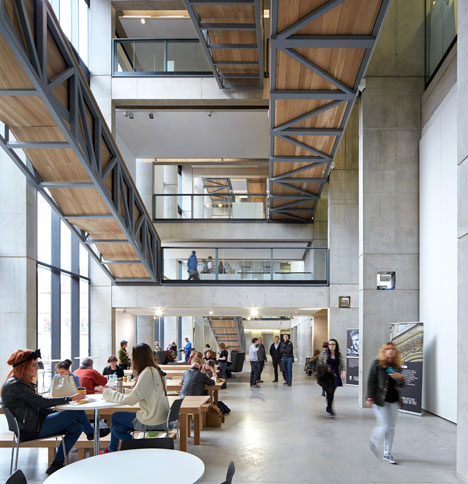
Photography is by Hufton + Crow.
Here's a project description from the architects:
Manchester School of Art
Context
Celebrating its 175th birthday in 2013, Manchester School of Art is one of the oldest institutions of its kind in the UK. The school was established in the 19th Century to help keep the region competitive in an international market and support regional industry in a wider marketplace.
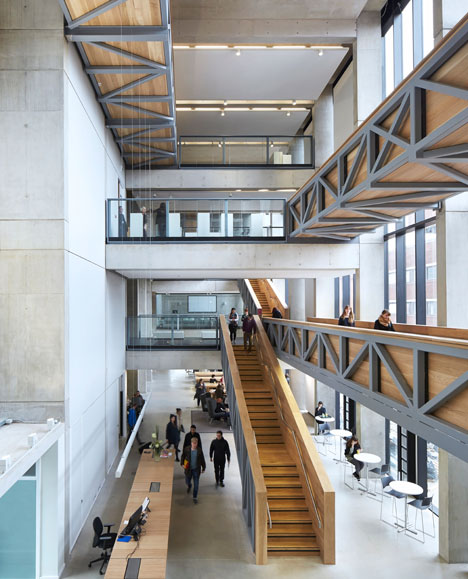
Now a faculty of Manchester Metropolitan University this remains an important objective for the Art school and a key part of the brief was to help the school bridge the gap between education and professional life.
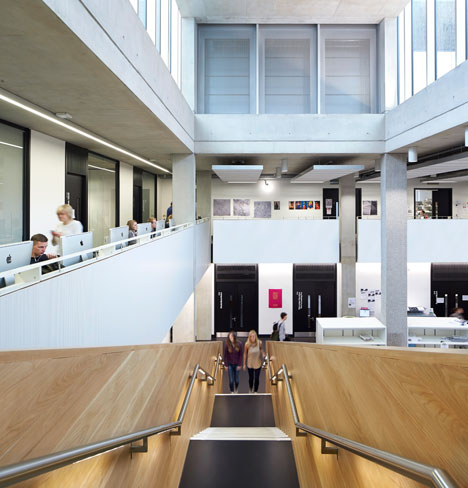
The new building celebrates the inter relation of the various art & design disciplines and encourages 21st century students to work alongside each other and enjoy the crossover rather than concentrating always on the differences. With a huge front window, it is also a building that is proud of its product and shows the work to everyone who passes by.
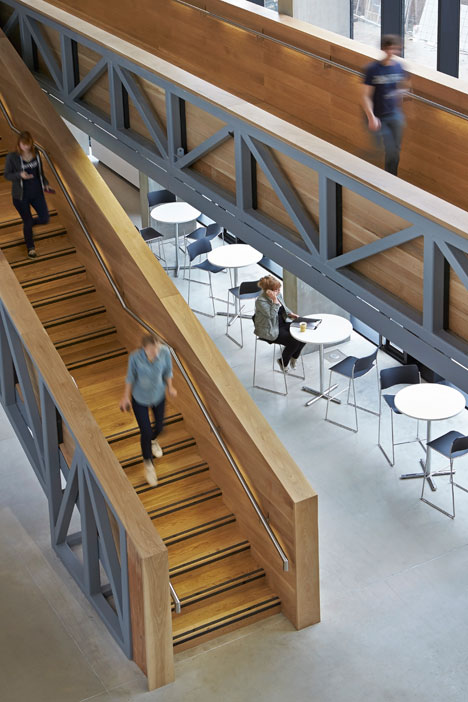
Now one of the leading Art & Design courses in the country, the School has around 3500 FTE students across its various disciplines. Housed within a range of late Victorian and post-war buildings, the School forms the southern edge of All Saints' Park, a green square at the heart of the city centre campus. The Art School Extension consists of an 8600-metre-squared new building of studios, workshops and a gallery; and a 9000m2 refurbishment of a 1960s Arts tower and plinth.
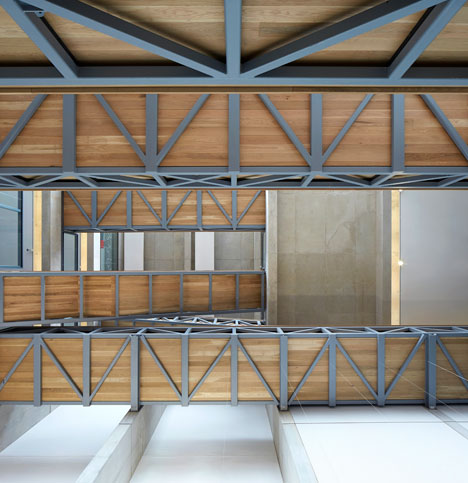
Concept
FCB's design of the Manchester School of Art has provided an engaging and lively environment in which to work and study and helped re-assert both the art school and the university's profile on the national stage. The Dean of the School, Professor David Crow, describes the scheme as "a hugely exciting arena where anything is possible and everything is relevant."
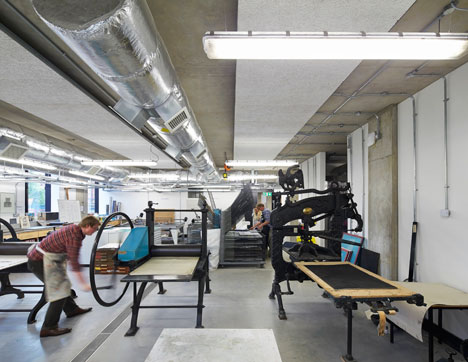
The working heart of the building comprises open studios, workshops and teaching spaces (known as the Design Shed.) A second element is a seven storey Vertical Gallery. This is the linking piece between the existing 1960s arts tower (known as the Chatham Building) and the new studio building. This vertical gallery provides a showcase space for the output of the School and acts as a shop window to the school itself.
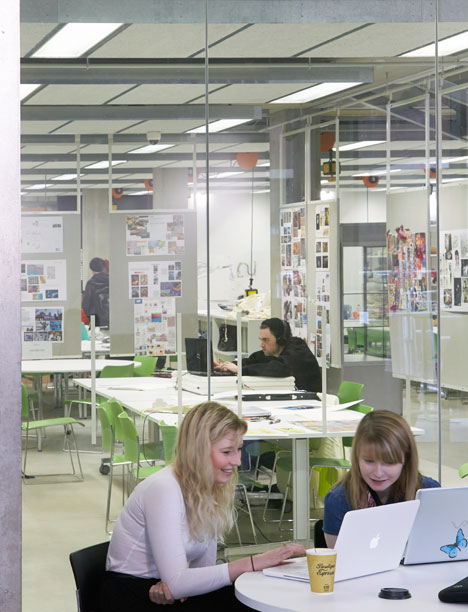
Hybrid Studio Space
The open studio space places a great focus on collaborative working in an atmosphere that is inherently creative. Students and MSA staff from a broad spectrum of contemporary design disciplines can work on projects in close communal proximity. This proximity encourages the sharing of ideas, techniques and methodologies in a way that was previously impossible.
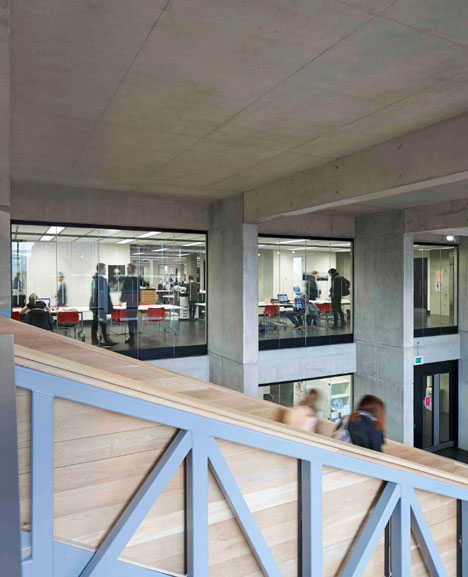
The Hybrid Studio is also an environment in which students can proudly display their work in a setting that is light and easy to explore.
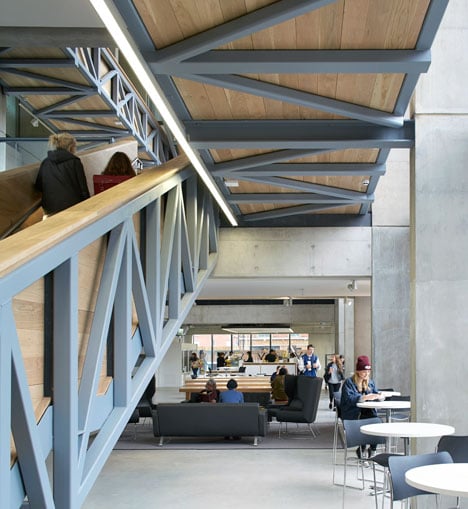
Materials
As a building for designers, and a place for teaching and learning about Art & Design the clarity and articulation of materials was crucial, as was the tonal and textural quality of the interior. The interiors are a study in concrete, with three distinct grades creating different atmospheres. Rough is used in back stairwells giving a sense of rawness and a factory aesthetic; double height cast concrete columns articulate the central spaces of the design shed, punctuated by four very special decorative concrete columns which were developed from an early 20th century wallpaper design by Lewis F Day, an eminent designer of his period, contemporary of Walter Crane a tutor at Manchester School of Art.
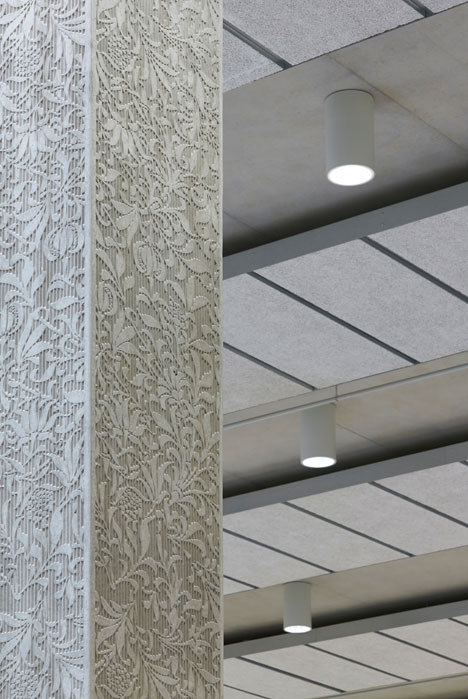
A secondary but important material is the use of oak linings to the stairs and linking corridors which span the vertical gallery. These provide a warmth to soften the hard edges of steel and concrete which form the structure.
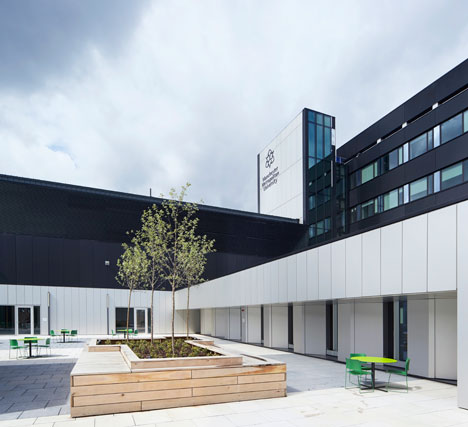
Collaboration
Working with clients who are artists and designers on a building for training artists & designers was a wonderfully rich experience for us. The level of collaboration was exceptionally high and we worked with the client by testing processes, recrafting ideas and always seeing the design as an iterative, creative process.
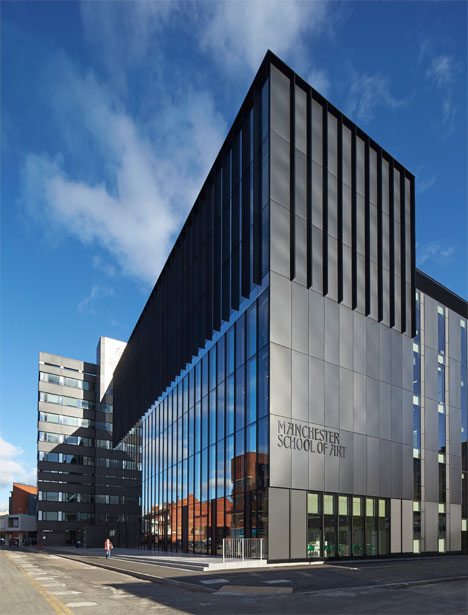
Client: Manchester Metropolitan University
Construction value: £23 million
Commissioned: June 2009
Construction Start Date: April 2011
Completion: April 2013
Project Gross Area: 17320sqm
Cost Consultant: Turner and Townsend
Contractor: Morgan Sindall
Structural engineer: Arup
